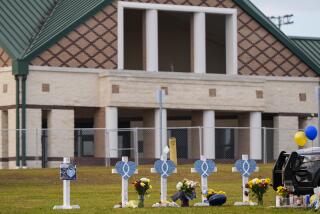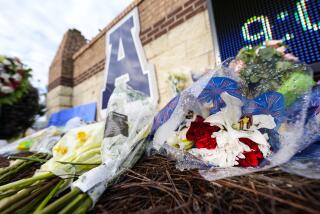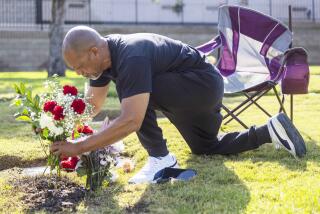Birthday-Present Guns Bring Grandfather a Lifetime of Guilt
NASHVILLE, Tenn. — Jennifer Stewart lay on her side facing her 3-year-old son, Bailey, her forehead resting lightly against his on the pillow. Her two other triplet sons slept beside them on the queen-size bed.
In the next room, her father, Darrel Stewart, was looking over three guns he had received as birthday presents.
Jennifer drifted off to sleep, never hearing the bullet that ripped through the bedroom wall and pierced Bailey’s skull. It was her father’s panicked cries that jolted her awake.
“I’ve shot Bailey! I’ve shot Bailey!” he screamed.
It was a near-fatal accident. As doctors worked to save Bailey at the hospital, the boy’s grandfather was so racked by guilt that friends shadowed him for days, fearing he might try to kill himself.
Jennifer was gripped by fear and sadness as she watched her tiny son fight for his life amid a tangle of tubes. But she never struggled with her feelings toward her father.
Anger? No, anger would open more wounds, Jennifer knew.
Love? Yes. Love heals.
Now, more than a year after the shooting, love endures as Jennifer and her father live and work together to help Bailey through a grueling rehabilitation.
One Tube to Breathe, Another to Eat
Bailey and his brothers, Avery and Mackenzie, were born Feb. 5, 1995, three days before Jennifer’s 21st birthday. She was in her third year at Vanderbilt University, studying sociology with dreams of going into law enforcement.
After the boys were born, Jennifer became estranged from their father. When the triplets were 2, she and the boys moved in with her father, who is separated from his wife.
Home videos show Bailey hunting for Easter eggs and trick-or-treating with his brothers, his light blond hair cut in a bowl shape, his blue eyes big and probing.
He called his Aunt Jill “Jo-Jo” and would say “Wee-haw!” when he got excited. When his grandfather told him the ray of light reflecting off his pocket watch really was Tinker Bell, the boy believed him.
“Bailey would just get a kick out of that,” Darrel said.
Now Bailey is in a wheelchair. He is fed through a tube in his stomach and breathes through a tube in his throat. He can swallow soft foods like pudding, but he cannot control his jaw muscles to chew. Sometimes he can grab things with his hands.
His grandfather has found that if he massages Bailey’s neck and legs, the boy will turn the pedals of a therapeutic tricycle. One night he took 25 steps in the living room, and he has said “Mama” more than once.
Therapists come and go nearly every day.
“I think he understands just about everything that’s going on around him,” Jennifer said. “And then other times it seems like he’s really out of it. I have to think he understands then too. He just may not be able to show it.”
Letting Doctors and God Do the Fixing
The accident happened May 3, 1998, on Darrel’s 51st birthday. He had received three guns as gifts and spent the evening inspecting them. He had 20 or so guns in his collection, all stored unloaded in plastic cases secured with locks.
In the next bedroom, Jennifer and her sons settled down for the night. Usually Avery and Mackenzie fought over who would sleep beside their mother, but that night they fell right asleep.
Jennifer looked at Bailey.
“Do you want to sleep beside Mom?” she asked.
“Uh-huh,” he murmured, and Jennifer pulled him closer.
“Is it OK that I love you forever?” she asked.
“Uh-huh.”
“It is?”
“Yep.”
“OK, then that’s what I’ll do.”
Her father picked up one of the guns, a Brazilian-made Taurus .45-caliber pistol. He didn’t think the clip was in all the way.
“To this day I don’t remember how it happened. I just remember hearing a boom,” he said.
A puff of smoke rose from the gun. He laid it down and saw a tiny hole in the wall.
“I thought, ‘My goodness, Jennifer and the boys are in there.’ ”
He banged on the door, and a groggy Jennifer opened it. He looked over her shoulder and saw a tiny pool of blood on Bailey’s pillow.
“I’ve shot Bailey!” he cried as he ran to his grandson.
“What happened?” she asked.
“I’ve shot Bailey!”
The bullet had ripped through the plasterboard wall and two panes of glass stored behind an entertainment center. It then ricocheted once, maybe twice, before striking Bailey in the left temple.
Darrel grabbed a washcloth, pressed it to Bailey’s head and carried him to the kitchen. He cleared the counter and began mouth-to-mouth resuscitation. The toddler’s body stiffened and Darrel had trouble prying open his jaw, so he began forcing air into Bailey’s nose.
Police and paramedics soon filled the house, and Bailey’s brothers began to scream.
Bailey was loaded into an ambulance. Darrel followed in his car, so shaken that he left his daughter behind. She climbed into a firetruck.
At Vanderbilt University Medical Center, doctors were not optimistic.
Dr. Steven Couch, assistant medical director for pediatric rehabilitation, said the bullet was lodged in Bailey’s brain near the thalamus, which controls motor functions, and the third ventricle, a conduit for spinal fluid.
Bailey’s brain was swollen. Doctors agreed the injury was inoperable.
Friends and family gathered in the waiting rooms, where Jennifer worried about her son and tried to console her father. “People were more concerned about [Darrel] than they were about me,” she said.
They feared guilt would consume her dad, a former Marine who owns a furniture installation business. They’d always thought of him as a “type-A fixer,” a guy who wants problems solved and solved now. This time, they told him, he’d have to let doctors and God do the fixing.
Darrel put his faith in God and held out hope. “You don’t take the cowardly way out and commit suicide,” he said.
Slow Recovery, Unclear Prognosis
Bailey was in a coma for six weeks and was hospitalized for nearly four months. Jennifer seldom left his side, leaving her other sons in the care of her father and other relatives.
She too was plagued by guilt. Would things be different had she not pulled her sleepy son closer that night?
“I was really upset that it happened to him and not me,” she said.
Though doctors call Bailey’s survival miraculous, he remains severely impaired. His recovery is slow, his prognosis unclear.
Most recovery for brain-injury patients occurs in the first year, although progress sometimes continues for up to three years, Couch said.
Physical, occupational and speech therapists work with Bailey at least 20 hours a week.
Jennifer is optimistic.
“I know that someday he’ll be perfectly fine. Even if it’s not while we’re here on this Earth, I know that someday he will,” she said.
One recent lunchtime at the Stewart home found Bailey dozing in his wheelchair while his mother put cheeseburgers on the griddle and prepared his liquid lunch. Suddenly a violent coughing attack, brought on by a cold, consumed the toddler.
Jennifer bent over and emptied the phlegm from her son’s breathing tube. Avery and Mackenzie played nearby.
“Mama, I’m hungry,” Avery said as his mother flipped burgers with one hand and let Bailey’s lunch drain into his stomach with the other.
“It’ll be ready in a second, sweetie,” she replied patiently. Two men working on the air conditioner hammered in the next room. One of Bailey’s therapists would be at the door any minute.
Her father’s help in caring for Bailey allowed Jennifer to graduate from Vanderbilt in May with a degree in sociology. She hopes to enroll in nursing school and learn more about Bailey’s treatment. Law enforcement, and guns, no longer interest her.
Like many daughters, she has arguments with her father from time to time. But they don’t involve placing blame for Bailey’s condition.
“They’re like a little team,” said Kathy Harrigan, Bailey’s speech therapist. “There’s no finger-pointing. They just work together to get it done.”
Darrel, who now keeps all but one of his guns at a friend’s house, still feels guilt. “Probably for the rest of my life I’ll feel a responsibility,” he said.
Jennifer believes the shooting has strengthened her love for her father.
“It was such a freak accident,” she said. “I know how he really feels about the boys, and I know he would have so much rather it had been himself.
“Before, I wanted to get a job and move out, and now I’ve kind of seen what’s important. Family is.”
More to Read
Sign up for Essential California
The most important California stories and recommendations in your inbox every morning.
You may occasionally receive promotional content from the Los Angeles Times.










